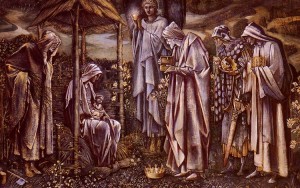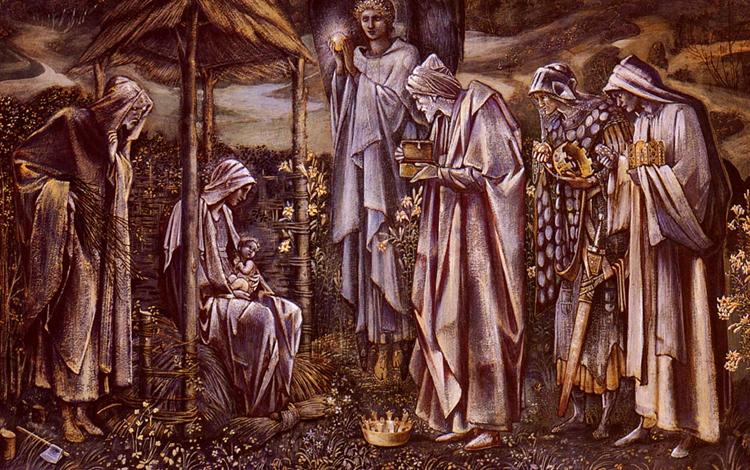
Central idea: The Epiphany reveals that salvation is for all peoples. Doctrine: The Church, sacrament of human unity. Practical application: Growing in human unity.
To view Lectionary 20, click here.
Central idea: The Epiphany reveals that salvation is for all peoples
Reading 1 Is 60:1-6
Rise up in splendor, Jerusalem! Your light has come,
the glory of the Lord shines upon you.
See, darkness covers the earth,
and thick clouds cover the peoples;
but upon you the LORD shines,
and over you appears his glory.
Nations shall walk by your light,
and kings by your shining radiance.
Raise your eyes and look about;
they all gather and come to you:
your sons come from afar,
and your daughters in the arms of their nurses.Then you shall be radiant at what you see,
your heart shall throb and overflow,
for the riches of the sea shall be emptied out before you,
the wealth of nations shall be brought to you.
Caravans of camels shall fill you,
dromedaries from Midian and Ephah;
all from Sheba shall come
bearing gold and frankincense,
and proclaiming the praises of the LORD.
- In Isaiah’s vision, the earth is covered in darkness but God’s glorious light shines on Jerusalem. People from every race and nation—even their kings—joyfully flock to Israel bearing gifts. The Chosen People who have been exiled from the Promised Land return. Everyone is drawn to Jerusalem because the radiance of God’s favor rests on her.
- This prophecy is realized in Jesus Christ, God’s anointed savior, and his Church, the New Israel made up of Jews and Gentiles.
- A first fulfillment is seen in the homage the pagan magi render to the infant Jesus.
- We are in the time of a fuller fulfillment as the Church’s missionary activity brings Christ’s salvation to the ends of the earth.
- The prophesy will be definitively fulfilled at the end of time when Christ comes in glory.
Responsorial Psalm Ps 72:1-2, 7-8, 10-11, 12-13
R. Lord, every nation on earth will adore you.
O God, with your judgment endow the king,
and with your justice, the king’s son;
He shall govern your people with justice
and your afflicted ones with judgment.Justice shall flower in his days,
and profound peace, till the moon be no more.
May he rule from sea to sea,
and from the River to the ends of the earth.The kings of Tarshish and the Isles shall offer gifts;
the kings of Arabia and Seba shall bring tribute.
All kings shall pay him homage,
all nations shall serve him.For he shall rescue the poor when he cries out,
and the afflicted when he has no one to help him.
He shall have pity for the lowly and the poor;
the lives of the poor he shall save.
- In Christ, God is calling together the one human race to acknowledge and serve him in holiness.
- All peoples are to lay their treasures at his feet.
- When this everlasting regime is established, then every nation on earth will adore him.
- The Church, his body on earth, in imitation of her head, never forgets the lowly and the poor, whether the privation is material or spiritual.
Reading 2 Eph 3:2-3a, 5-6
Brothers and sisters:
You have heard of the stewardship of God’s grace
that was given to me for your benefit,
namely, that the mystery was made known to me by revelation.
It was not made known to people in other generations
as it has now been revealed
to his holy apostles and prophets by the Spirit:
that the Gentiles are coheirs, members of the same body,
and copartners in the promise in Christ Jesus through the gospel.
- God’s revelation is entrusted to the apostles and their successors. God’s grace is dispensed through the Sacraments.
- God’s salvation is for everyone: the Gospel is as much for the Gentiles as for the Jews.
Gospel Mt 2:1-12
When Jesus was born in Bethlehem of Judea,
in the days of King Herod,
behold, magi from the east arrived in Jerusalem, saying,
“Where is the newborn king of the Jews?
We saw his star at its rising
and have come to do him homage.”
When King Herod heard this,
he was greatly troubled,
and all Jerusalem with him.
Assembling all the chief priests and the scribes of the people,
He inquired of them where the Christ was to be born.
They said to him, “In Bethlehem of Judea,
for thus it has been written through the prophet:
And you, Bethlehem, land of Judah,
are by no means least among the rulers of Judah;
since from you shall come a ruler,
who is to shepherd my people Israel.”
Then Herod called the magi secretly
and ascertained from them the time of the star’s appearance.
He sent them to Bethlehem and said,
“Go and search diligently for the child.
When you have found him, bring me word,
that I too may go and do him homage.”
After their audience with the king they set out.
And behold, the star that they had seen at its rising preceded them,
until it came and stopped over the place where the child was.
They were overjoyed at seeing the star,
and on entering the house
they saw the child with Mary his mother.
They prostrated themselves and did him homage.
Then they opened their treasures
and offered him gifts of gold, frankincense, and myrrh.
And having been warned in a dream not to return to Herod,
they departed for their country by another way.
- These magi understood the Christ child to be the king of the Jews. Learned Jews testified that this messiah would be sent by God to shepherd and rule Israel.
- As Peter would say to the upright and God-fearing pagan, Cornelius, “God shows no partiality, but in every nation any one who fears him and does what is right is acceptable to him” (Acts 10:34-35). These pagan magi were acceptable to God because they feared God and did what was right. They were led by God’s power to Christ and brought gifts to him and his family—to Mary and Joseph—as Isaiah and the psalmist foresaw.
- Even though we are not pagans but members of God’s family through Baptism, we too bring our gifts, whatever they are, and lay them at the feet of Christ and his family, the Church.
- We do this out of gratitude, because of the good that God has done for us. And we bring our gifts in a spirit of service for anyone in need.
- As the Psalmist foresaw, “he shall rescue the poor when he cries out, and the afflicted when he has no one to help him. He shall have pity for the lowly and the poor; the lives of the poor he shall save.
- Christ gives to the world what the world needs but he gives it through human instruments. We are those instruments.
Doctrine: The Church, sacrament of human unity
- The Church is the sacrament of human unity. This means the Church is both a sign of human unity and the means by which this unity is realized. This unity is the community or communion or friendship or fellowship or family or even marriage among the human beings joined to Christ through his Church.
- God’s will is to “gather all his children into the unity of the Church.” These children of God are first the Jews and then later the Gentiles. (CCC 60)
- This human unity is the work of the Holy Spirit acting through the Church. “As the ‘convocation’ of all men for salvation, the Church . . . is . . . sent by Christ to all the nations to make disciples of them.” (CCC 767)
- “The seven sacraments are the signs and instruments by which the Holy Spirit spreads the grace of Christ the head throughout the Church which is his Body. The Church, then, both contains and communicates the invisible grace she signifies.” (CCC 774)
- Thus, the Church “is like a sacrament—a sign and instrument, that is, of communion with God and of unity among all men.” First, a sign and instrument of “the inner union of men with God. Then, a sign and instrument of “the unity of the human race as “she gathers men ‘from every nation, from all tribes and peoples and tongues’.” This gathering has begun but it is not yet fully realized. (CCC 775)
- The Church is Christ’s instrument in this task of showing and making real God’s love for men. “God desires ‘that the whole human race may become one People of God, form one Body of Christ, and be built up into one temple of the Holy Spirit’.” (CCC 776)
- Even though everyone who “fears God and does what is right” is acceptable to God, he has “willed to make men holy and save them, not as individuals without any bond or link between them, but rather to make them into a people who might acknowledge him and serve him in holiness.” This is the meaning of salvation history, beginning with the Jews and their covenants with God and culminating with Christ and his New Covenant, in which he calls “together a race made up of Jews and Gentiles which would be one, not according to the flesh, but in the Spirit.” (CCC 781)
Practical application: Growing in human unity
- CCC 775 speaks of a double but interrelated unity. Each of us has a part to play in this unity.
- First is our “inner union . . . with God.” We really can meet God each day by reading and meditating on the Sacred Scriptures and by the reception of Holy Communion.
- As Pope Francis put it, “I invite all Christians, everywhere, at this very moment, to a renewed personal encounter with Jesus Christ, or at least an openness to letting him encounter them; I ask all of you to do this unfailingly each day. No one should think that this invitation is not meant for him or her, since ‘no one is excluded from the joy brought by the Lord.’” (“Love is Our Mission” catechesis for the World Meeting of Families, September 2015).
- Second is our union with all other persons through friendship and apostolate. Like the magi who brought their gifts to the Christ Child or the people from the ends of the earth who will bring their gifts to Jerusalem, we bring our gifts in service to our fellow man.
- Our inner union with God helps us to see what gifts we have to offer for others’ good and salvation. This inner union also motivates us to actually give them. The gifts we offer our fellow man are the gold, frankincense, and myrrh we lay at the cradle of Christ.
- Like St. Paul, we are stewards of God’s grace given for the benefit of others. The gifts we have to offer are everything good we might possess: goodness, beauty, truth, time, talents, treasures, physical strength, knowledge and understanding, courage, kindness, friendship, protection, life, correction, humor, weakness, vulnerability, suffering, work, craftsmanship, skill–and many others.
- First is our “inner union . . . with God.” We really can meet God each day by reading and meditating on the Sacred Scriptures and by the reception of Holy Communion.
Written as an aid for homilists and a resource for the faithful, this doctrinal homily outline (1) provides insights into the Lectionary readings, (2) explicates a doctrine of Catholic Faith or morals from them, and (3) shows specific ways lay persons can live these truths. (To read more about this approach, click here.)
This outline is written to be in accord with the Homiletic Directory issued by the Congregation for Divine Worship and the Discipline of the Sacraments (2014). (To read an excellent summary of the Homiletic Directory, click here.)

Leave a Reply